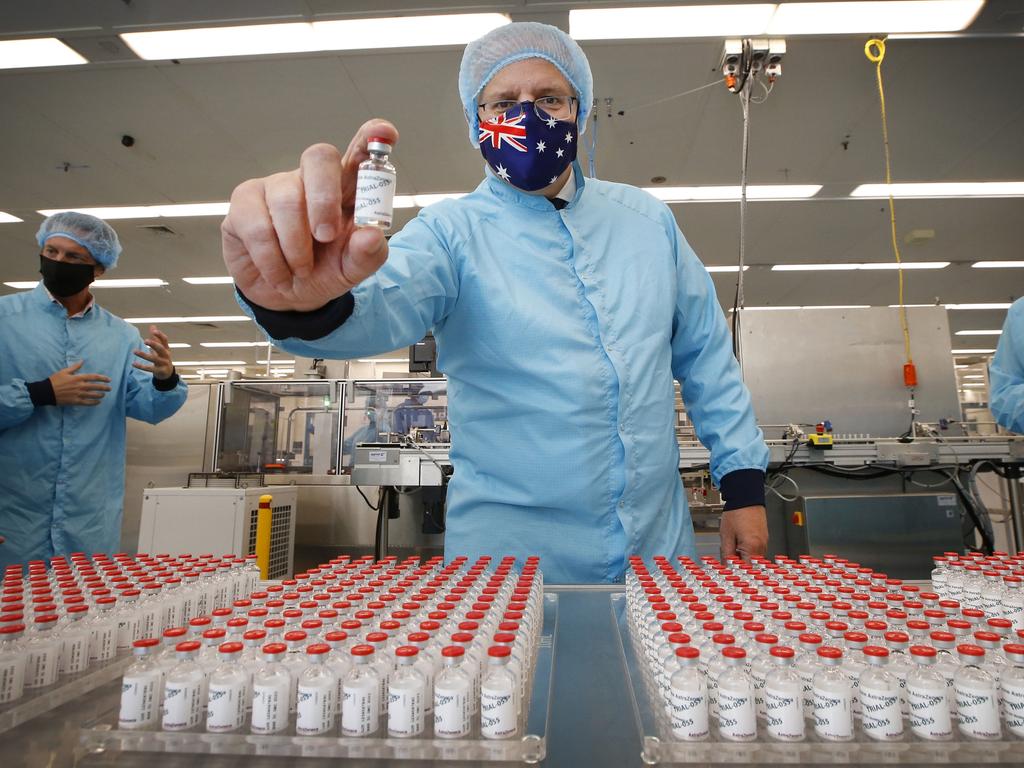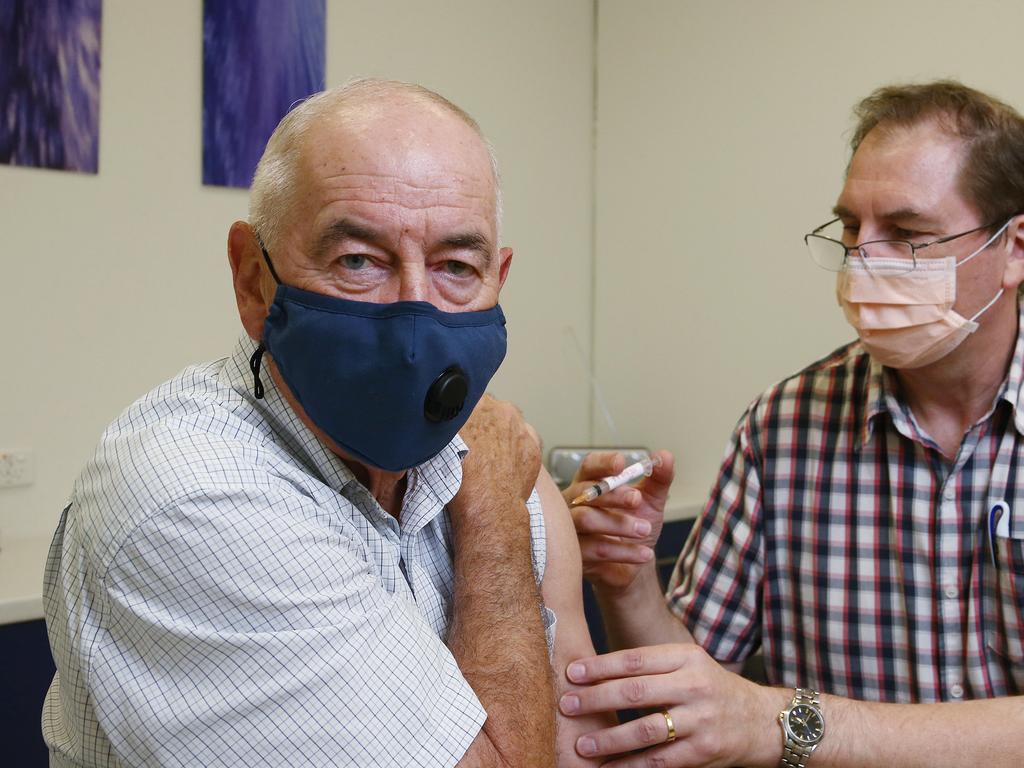Stay calm,and keep getting the jab, says Scott Morrison
Scott Morrison has urged Australians to keep getting coronavirus inoculations and declared the AstraZeneca vaccine a ‘lifesaver’ as the government secured another 20m doses of the Pfizer jab.

Scott Morrison has urged Australians to keep getting coronavirus inoculations and declared the AstraZeneca vaccine a “lifesaver” as the government secured another 20 million doses of the Pfizer jab to be given to under-50s.
The government is pushing Pfizer to speed up the distribution of its vaccine after health advisers recommended it as the preferred jab for under-50s, rather than AstraZeneca which has a rare risk of bloodclotting.
But it insists phases of the program aimed at the most vulnerable will be largely unaffected.
The Prime Minister, speaking after a meeting of national cabinet, sought to reassure those aged over 50 that the balance in favour of them getting the AstraZeneca jab outweighed the small risk of the vaccine by many orders of magnitude.
“My mum is getting it in a couple of weeks,” Mr Morrison said. “She is back at The Lodge at the moment and she told me she is booked in and she is looking forward to having her AstraZeneca vaccine and she was pretty happy for me to tell people about that.”
Mr Morrison said that, for people over 50, there was “strong encouragement to be taking this AstraZeneca vaccine which we discussed today to ensure that we can continue down the path of the vaccination rollout’’.
“The goal here is to protect the most vulnerable in our community,” he said. “If we want to treat COVID-19 like the flu then we need to ensure that we’re vaccinating those in our community who are most vulnerable.’’
The government was forced to reassess its vaccine program after receiving advice from the Australian Technical Advisory Group on Immunisation that Pfizer should be the preferred vaccine for under-50s after extremely rare cases of blood-clotting were reported in people who had received the AstraZeneca jab.
Mr Morrison said that, under the deal with Pfizer, the extra 20 million doses would be available in the final quarter of this year.
“We will obviously be doing everything we can to seek to move that forward where we can but that is very welcome news,” Mr Morrison said.
The extra doses, which were secured on Thursday night after Australia “exercised its capacity” within the Pfizer contract, will take Australia’s total Pfizer order to 40 million doses. About 1.1 million doses have so far arrived.
Health Minister Greg Hunt said there would be a significant expansion in coming months of Pfizer vaccine deliveries. The number of doses arriving in each shipment would increase from the current 130,000 a week in May, and double from July.
The government has contracts for 170 million vaccine doses, including 53.8 million of AstraZeneca, 51 million of Novavax and 25.5 million more doses through the COVAX Facility. Novavax is expected to become available after July and will also be given to the under-50s.
Mr Hunt said the government was working on providing the extra doses of the Pfizer vaccine to coincide with the phase of the vaccination program aimed at those aged under 50.
“With regards to phase 1B, this is the over 70s and the over 80s and the over 55 Indigenous Australians, all of those can continue to receive with the strongest medical advice the AstraZeneca,” Mr Hunt said.
“For those who may be immunocompromised or frontline workers who are under 50, then right now we are working with the states and territories and the medical authorities to revise that part of the program so as they have access to Pfizer. That will take time.”
Despite federal government assurances that anyone under 50 could get the AstraZeneca vaccine in consultation with their doctor if they deemed it was of benefit, Western Australia on Friday barred people under the age of 50 from getting the shot. WA’s chief health officer, Andrew Robertson, said: “People under 50 who are booked in to receive their AstraZeneca vaccine will have their appointments cancelled.”
Tasmania also paused giving AstraZeneca shots to anyone aged under 50 as the government sought advice.
NSW temporarily paused its administration of the AstraZeneca shot on Friday as patient consent forms were updated.
With the Morrison government facing criticism over the slowness of the rollout, there will be daily and weekly statistics released showing a breakdown of vaccines administered by federal, state and territory governments.
Figures released on Friday show there had been 1.08 million doses administered, including 81,297 in the past 24 hours.
There were 408,290 vaccines given by the commonwealth in primary care centres, and 133,052 jabs administered in aged and disability facilities.
State governments were responsible for 536,169 of the vaccines, including 146,724 by NSW, 137,320 by Victoria, 105,283 by Queensland and 64,767 by Western Australia.
There had been 21,475 vaccines administered by Tasmania, 34,707 by South Australia, 15,823 by the ACT and 10,070 by the Northern Territory.
Mr Morrison sought to reassure over-50s that the AstraZeneca vaccine was a “lifesaver” and the risks posed by the shot were extremely remote.
“The most vulnerable people in our community are not just over 50, they are actually a lot older than that,” the Prime Minister said. “The AstraZeneca vaccine is well suited to address those critical vulnerable groups.”
ATAGI provided a further explanation of its decision to recommend an alternative shot to AstraZeneca in the under-50s, saying it relied on a UK analysis quantifying the risk versus the benefit of the vaccine, applying greater caution to the calculations because Australia was a virtually zero COVID-19 environment and there have been no deaths from the virus so far this year.
The UK data showed that the risk in a low-exposure COVID-19 environment to a serious harm due to the vaccine in those aged in their twenties was at the rate of 1.1 per 100,000 people, whereas the risk of entering ICU with the virus was only 0.8 per 100,000. “The risk of severe COVID is strongly linked to age.,” said Allen Cheng, the chair of the Australian Technical Advisory Group on Immunisation.
“The risk of death from COVID rises roughly three-fold for every 10 years of age," Professor Cheng said.
“A 50 year old is roughly 10 times more likely to die from COVID than a 30 year old.
“So the benefit of getting vaccinated (and not getting COVID) is much higher for older people than younger people.”
Professor Cheng said ATAGI’s recommendations on the AstraZeneca vaccine may change if there was a large outbreak of COVID-19 in the community.







To join the conversation, please log in. Don't have an account? Register
Join the conversation, you are commenting as Logout